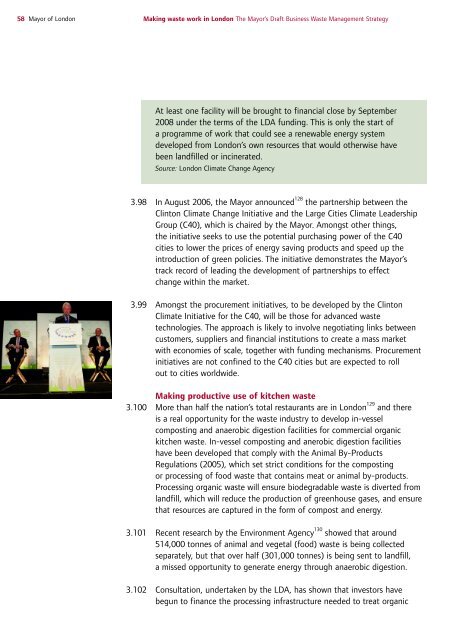Draft Business Waste Strategy PDF - london.gov.uk - Greater ...
Draft Business Waste Strategy PDF - london.gov.uk - Greater ...
Draft Business Waste Strategy PDF - london.gov.uk - Greater ...
You also want an ePaper? Increase the reach of your titles
YUMPU automatically turns print PDFs into web optimized ePapers that Google loves.
58 Mayor of London<br />
Making waste work in London The Mayor’s <strong>Draft</strong> <strong>Business</strong> <strong>Waste</strong> Management <strong>Strategy</strong><br />
At least one facility will be brought to financial close by September<br />
2008 under the terms of the LDA funding. This is only the start of<br />
a programme of work that could see a renewable energy system<br />
developed from London’s own resources that would otherwise have<br />
been landfilled or incinerated.<br />
Source: London Climate Change Agency<br />
3.98 In August 2006, the Mayor announced 128 the partnership between the<br />
Clinton Climate Change Initiative and the Large Cities Climate Leadership<br />
Group (C40), which is chaired by the Mayor. Amongst other things,<br />
the initiative seeks to use the potential purchasing power of the C40<br />
cities to lower the prices of energy saving products and speed up the<br />
introduction of green policies. The initiative demonstrates the Mayor’s<br />
track record of leading the development of partnerships to effect<br />
change within the market.<br />
3.99 Amongst the procurement initiatives, to be developed by the Clinton<br />
Climate Initiative for the C40, will be those for advanced waste<br />
technologies. The approach is likely to involve negotiating links between<br />
customers, suppliers and financial institutions to create a mass market<br />
with economies of scale, together with funding mechanisms. Procurement<br />
initiatives are not confined to the C40 cities but are expected to roll<br />
out to cities worldwide.<br />
Making productive use of kitchen waste<br />
3.100 More than half the nation’s total restaurants are in London 129 and there<br />
is a real opportunity for the waste industry to develop in-vessel<br />
composting and anaerobic digestion facilities for commercial organic<br />
kitchen waste. In-vessel composting and anerobic digestion facilities<br />
have been developed that comply with the Animal By-Products<br />
Regulations (2005), which set strict conditions for the composting<br />
or processing of food waste that contains meat or animal by-products.<br />
Processing organic waste will ensure biodegradable waste is diverted from<br />
landfill, which will reduce the production of greenhouse gases, and ensure<br />
that resources are captured in the form of compost and energy.<br />
3.101 Recent research by the Environment Agency 130 showed that around<br />
514,000 tonnes of animal and vegetal (food) waste is being collected<br />
separately, but that over half (301,000 tonnes) is being sent to landfill,<br />
a missed opportunity to generate energy through anaerobic digestion.<br />
3.102 Consultation, undertaken by the LDA, has shown that investors have<br />
begun to finance the processing infrastructure needed to treat organic
















